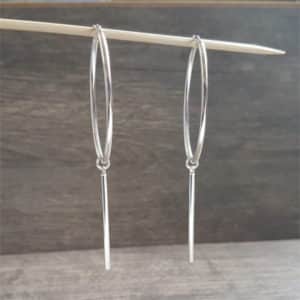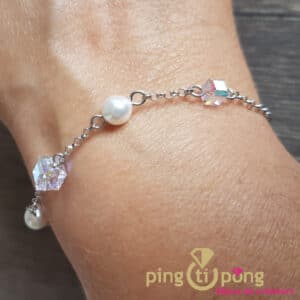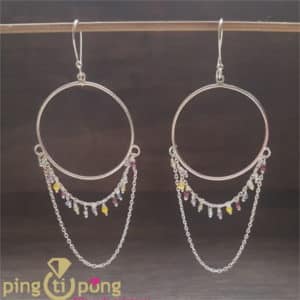Example of rhodium-plated 925 silver jewelry
First of all, all rhodium-plated jewelry is made of “925” or “sterling” silver.
Designers such as SPARK, Olivier LAFOND, CANYON and OSTROWSKI Design specialize in working with this noble material, and you’ll find more illustrations of their work at the end of the page …
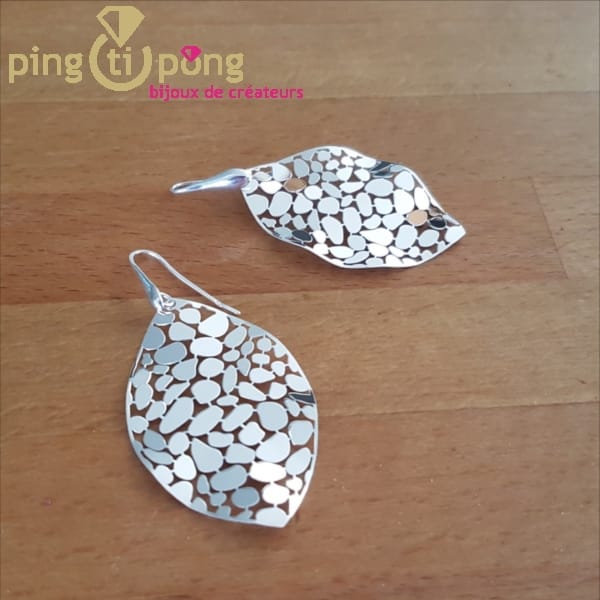
Leaves” earrings in rhodium-plated 925 sterling silver by CANYON
Usefulness: avoids oxidation of the jewellery
The main purpose of rhodium plating silver jewelry is to prevent oxidation.
Without rhodium plating, the surface of conventional silver jewelry oxidizes in the air and on contact with the skin. Over time, you’ve probably already seen this phenomenon appear on your silver-plated chains, necklaces, bracelets or rings: the jewels become dull and take on a blackened appearance with dark spots.
Rhodium protects silver and even makes it a little whiter and shinier, bringing out the brilliance of the stones adorning your jewel.
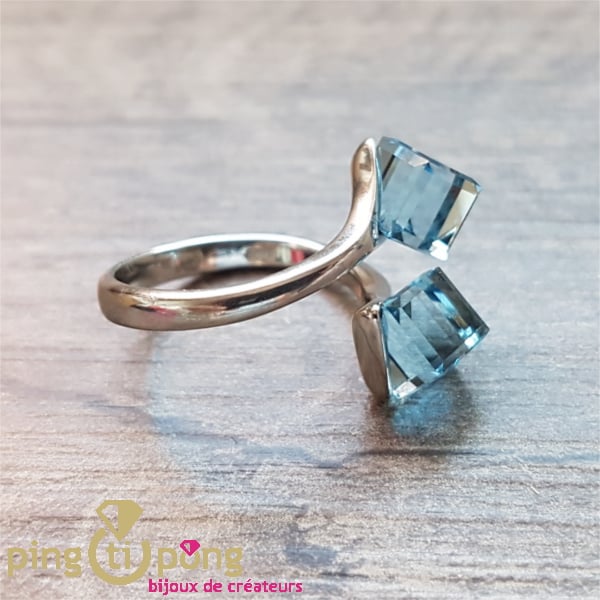
Ring “toi et moi” cubes in rhodium-plated 925 silver with Swarovski® crystals by SPARK
Color: whiter than pure silver
In terms of color, rhodium-plated silver jewelry is very similar to non-rhodium-plated silver jewelry, but with a slightly whiter and, above all, brighter hue.
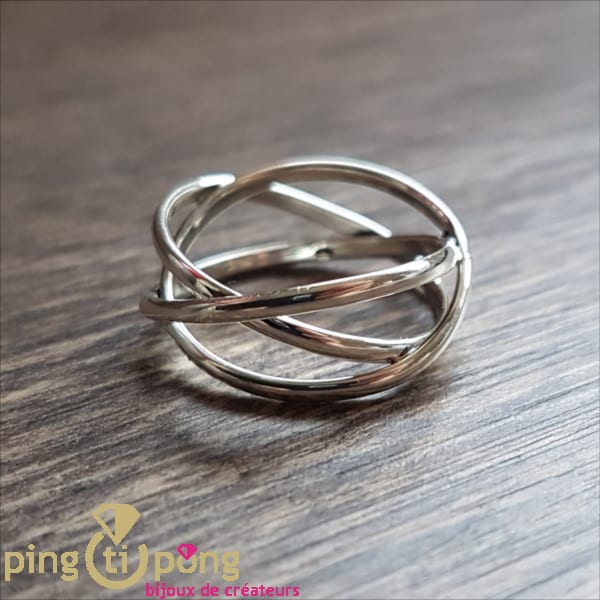
Wire ring in rhodium-plated 925 silver from CANYON
How do I remove oxidation from non-rhodium-plated silver jewellery?
When a silver jewel is not rhodium plated, you must maintain it from time to time: a silver jewel oxidizes naturally and blackens according to the frequency of its use, the contacts with the skin, the air, water or perfume. This is particularly true for people who wear silver chains or bracelets on a daily basis.
There are several ways to avoid the phenomenon or remove traces of oxidation, the most effective of which is to store them in a small airtight bag or in tissue paper: this will delay blackening as long as possible when you are not wearing the jewels.
To remove oxidation, there are many grandmotherly recipes (ash, toothpaste, etc.) which are more or less effective. There are also a number of product ranges to which you need to be careful, however, as not all are safe for the stones, pearls and veneers that make up your jewels.
Other cleaning techniques can also be dangerous for the stones or amber adorning your silver jewels, such as ultrasonic baths, which can crack them.
For our part, we recommend Connoisseur dry wipes, which are highly effective and respectful of amber, precious metals and Swarovski ® crystals.
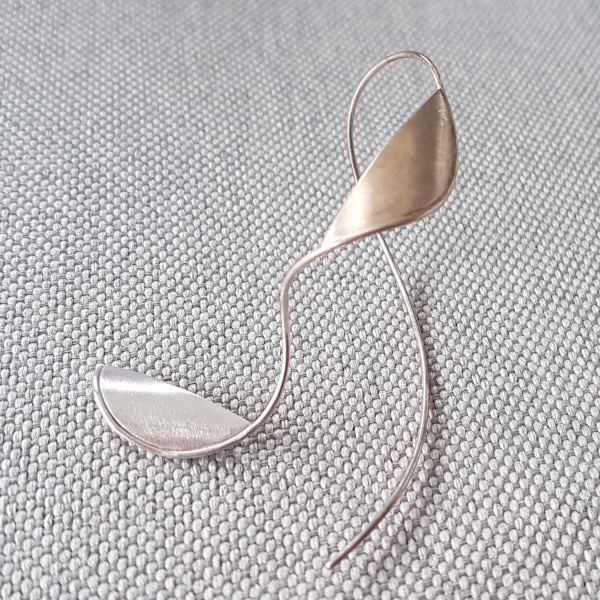
One leaf is oxidized, the other has been rubbed with a jewelry wipe.
What is rhodium?
Source: Wikipedia: Rhodium is a metal close to platinum that is very rare and therefore very expensive. Discovered by William Hyde Wollaston in 1803 in South Africa, it is also found in mines in the Urals and Ontario. It is used in jewellery, but also in the automotive industry, orthodontics, projector mirrors and photography. To meet ecological standards, it is used in particular to reduce toxic emissions in catalytic converters, as it has the same properties as platinum.
Growing demand explains its high and rising price. Its name comes from the Greek “Rhodon” which means pink, however when it is applied to silver jewellery during the rhodium plating process, it gives it a slightly whiter and brighter colour. As we’ve already mentioned, once plated on your rings, necklaces and bracelets, it prevents them from oxidizing and darkening.
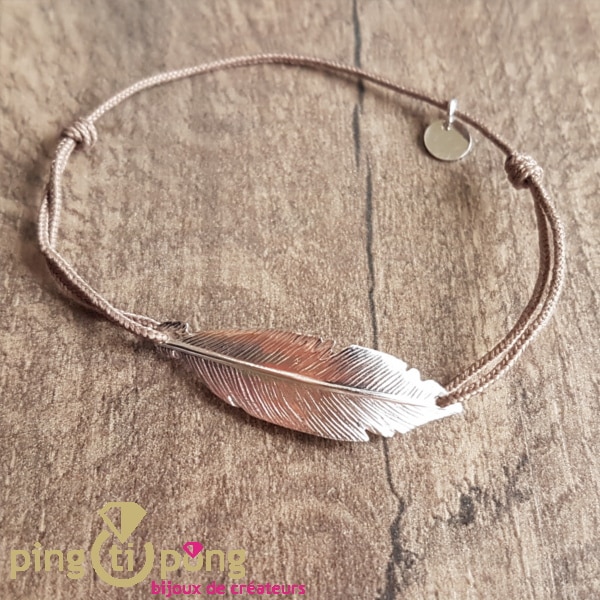
Feather bracelet in rhodium-plated 925 silver on lace by Olivier Lafond
Is a silver jewel covered with Rhodium more expensive?
The chemical process used to coat solid silver is known as electrolysis, and it enables the plating of precious metals: rhodium atoms are chemically fixed to silver atoms by the passage of a current through the jewel.
This process deposits a very even, highly resistant layer on the surface in thicknesses ranging from 1 to 5 microns. The quality of the rhodium plating and its resistance to rubbing obviously depend on the thickness deposited, but from 1 to 5 microns is a very good compromise between resistance and price, limiting the additional cost of the jewel. At the end of 2020, a kilo of Rhodium was worth about €600,000 compared to €46,000 per kilo of gold and €700 per kilo of silver. We can see that its price is more than 10 times that of gold and not far from 100 times that of silver. The extra cost for a piece of jewelry can range from €3 to €15, depending on the quantity of rhodium used.
How to differentiate 100% silver jewellery from silver-plated jewellery?
To help you differentiate between silver and silver-plated metals, you can look for the existence of a hallmark on the jewel. Manufacturers of silverware, noble metal products and solid silver are obliged to affix a hallmark to their products, making it easy to differentiate between different qualities of metal.
Each shape of hallmark indicates the quantity of noble metal in carats or thousandths.
For example, for 925 thousandths silver, the hallmark represents the Minerva head.
The punches are generally present inside the rings, on the clasps of the chains or behind the pendants…

